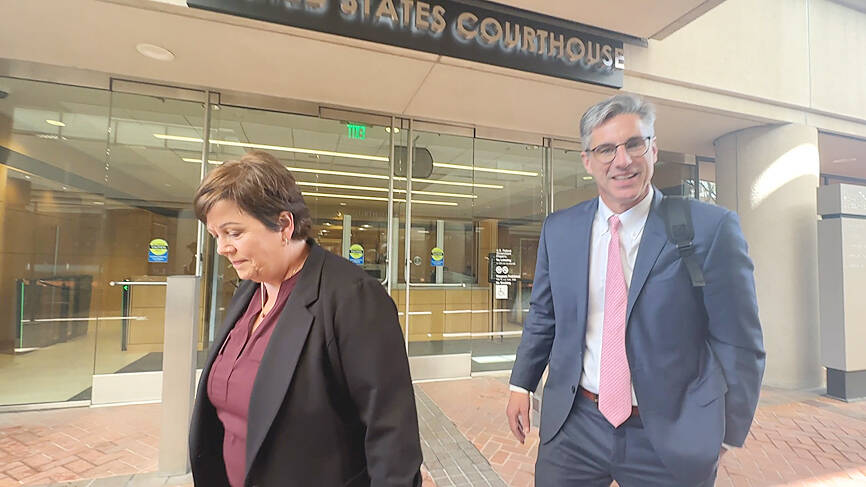An employment discrimination lawsuit against contract chipmaker Taiwan Semiconductor Manufacturing Co (TSMC, 台積電) might soon be expanded after a hearing in a federal court in San Jose, California, on Tuesday to add 15 plaintiffs to the case.
According to a court document, the lawsuit, which was refiled in November last year as a form of a class action with 13 plaintiffs in California, wants to add 15 plaintiffs from Arizona, where TSMC is building up its wafer fab capacity.
TSMC first committed between 2020 and last year to invest US$65 billion in three advanced wafer fabs in Arizona.

Photo: CNA
It then pledged an additional US$100 billion last month to build three more fabs, two integrated circuit assembly plants, and one research and development center in Arizona.
The employment discrimination lawsuit was first submitted in August last year on behalf of Deborah Howington, who reportedly began working for TSMC in February 2023 as a deputy director for talent acquisition at a company office in San Jose.
The refiled complaint in November last year alleged that as of Dec. 31, 2023, the vast majority of TSMC’s 2,668 workers in North America were from Taiwan and China.
That showed an “intentional pattern and practice of employment discrimination against individuals who are not of East Asian race, not of Taiwanese or Chinese national origin, and who are not citizens of Taiwan or China,” the complaint said.
These include “discrimination in hiring, staffing, promotion, and retention/termination decisions,” it said.
“TSMC routinely subjects non-East Asians (including those who are not of Taiwanese or Chinese descent) to a hostile work environment where verbal abuse, gaslighting, isolation and humiliation is common, and oftentimes leads to the constructive discharge of these employees,” the complaint said.
The plaintiffs claimed executives in TSMC’s US facilities often lashed out and shouted at them in public just because they were Americans, saying they were described as “lazy” and “stupid.”
TSMC has denied the accusations.
During the hearing, Howington’s lawyer Daniel Kotchen said the additional 15 plaintiffs would provide extra critical evidence to prove TSMC’s systematic discriminatory practices in the case, and their participation would help the case proceed in favor of the plaintiffs.
In response, TSMC lawyer Fletcher Alford said at the hearing that it was inappropriate for 15 plaintiffs from Arizona to file a suit against an Arizona employer in California.
At the same time, the case has proceeded for more than seven months and both sides wanted to expedite the trial, especially with TSMC set to expand its investments in North America, he added.
Given that, Alford said it was hard to see how increasing the class action suit would accelerate the case, and he urged the court not to grant the motion to add plaintiffs.
Judge Virginia DeMarchi said the case was challenging because new plaintiffs wanted to join the class action, but were also filing individual claims.
TSMC was not immediately available for comment on Tuesday’s hearing.

Sweeping policy changes under US Secretary of Health and Human Services Robert F. Kennedy Jr are having a chilling effect on vaccine makers as anti-vaccine rhetoric has turned into concrete changes in inoculation schedules and recommendations, investors and executives said. The administration of US President Donald Trump has in the past year upended vaccine recommendations, with the country last month ending its longstanding guidance that all children receive inoculations against flu, hepatitis A and other diseases. The unprecedented changes have led to diminished vaccine usage, hurt the investment case for some biotechs, and created a drag that would likely dent revenues and

Global semiconductor stocks advanced yesterday, as comments by Nvidia Corp chief executive officer Jensen Huang (黃仁勳) at Davos, Switzerland, helped reinforce investor enthusiasm for artificial intelligence (AI). Samsung Electronics Co gained as much as 5 percent to an all-time high, helping drive South Korea’s benchmark KOSPI above 5,000 for the first time. That came after the Philadelphia Semiconductor Index rose more than 3 percent to a fresh record on Wednesday, with a boost from Nvidia. The gains came amid broad risk-on trade after US President Donald Trump withdrew his threat of tariffs on some European nations over backing for Greenland. Huang further

CULPRITS: Factors that affected the slip included falling global crude oil prices, wait-and-see consumer attitudes due to US tariffs and a different Lunar New Year holiday schedule Taiwan’s retail sales ended a nine-year growth streak last year, slipping 0.2 percent from a year earlier as uncertainty over US tariff policies affected demand for durable goods, data released on Friday by the Ministry of Economic Affairs showed. Last year’s retail sales totaled NT$4.84 trillion (US$153.27 billion), down about NT$9.5 billion, or 0.2 percent, from 2024. Despite the decline, the figure was still the second-highest annual sales total on record. Ministry statistics department deputy head Chen Yu-fang (陳玉芳) said sales of cars, motorcycles and related products, which accounted for 17.4 percent of total retail rales last year, fell NT$68.1 billion, or

MediaTek Inc (聯發科) shares yesterday notched their best two-day rally on record, as investors flock to the Taiwanese chip designer on excitement over its tie-up with Google. The Taipei-listed stock jumped 8.59 percent, capping a two-session surge of 19 percent and closing at a fresh all-time high of NT$1,770. That extended a two-month rally on growing awareness of MediaTek’s work on Google’s tensor processing units (TPUs), which are chips used in artificial intelligence (AI) applications. It also highlights how fund managers faced with single-stock limits on their holding of market titan Taiwan Semiconductor Manufacturing Co (TSMC, 台積電) are diversifying into other AI-related firms.